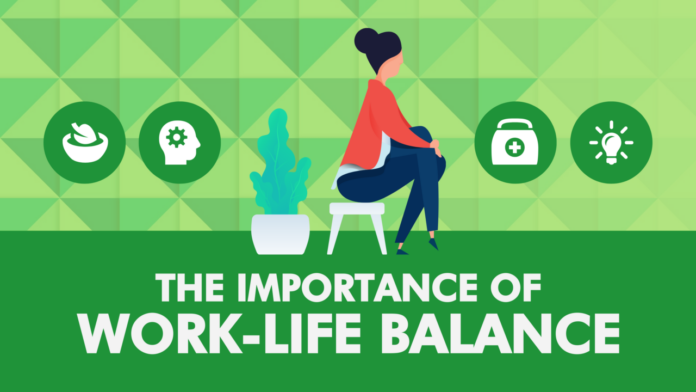Work-life balance refers to the proportion of an individual’s time spent working compared to the amount of time they spend with their loved ones or engaging in their interests and hobbies outside of work. If your job demands more time or attention, you will have less time to dedicate to the other side of your life.
Many people aim to bring their personal and professional lives closer together to reduce the amount of time their occupations take up during their waking hours. On the other hand, the very idea may be misleading because our personal and professional lives may not always exist in separate spheres.
The concept of work-life integration, also known as the fruitful blending of our personal and professional responsibilities, has become increasingly popular due to the trend discussed earlier. The viewpoint that our jobs are only a small part of our lives and that job outcomes are what matters is commonly held nowadays. As a result, they need to be reviewed in connection with various other significant factors, such as the state of our communities, the quality of our relationships with our friends and family, and our physical and mental health.
Why it’s crucial to strike a balance between work and life

It is possible to improve your overall well-being, which includes your physical, emotional, and mental health, by striking a better balance between your personal and work lives. This improvement can be beneficial to you in several ways. According to research, working long hours is linked to various serious health issues, including insufficient sleep, depression, heavy drinking, diabetes, decreased memory, and coronary disease. Unfortunately, these circumstances can also worsen our work-life balance problems, resulting in burnout and other adverse health consequences.
Contrary to the widespread notion shared by employees and employers, research has concluded that working longer does not increase productivity. For example, a study in 2014 found that as employees reached a certain amount of hours, their performance began to decrease as the chance of mistakes and health difficulties increased. So, maintaining a healthy work-life balance might reduce stress and improve emotional states, ultimately leading to an increase in total productivity and an improvement in profitability.
How to improve your work-life balance

The following suggestions can help you achieve a better work-life balance. You can begin testing each one individually or putting many into action simultaneously. It is important to remember that discovering a method that functions well for you is a process that will take some time.
Take your time in planning
Creating a new work-life integration strategy that meets your needs will require you to set aside some time so that you may gain an understanding of how the many aspects of your life are influencing one another. Take a moment to reflect on the balance of work and life right now and ask yourself how you feel. Some questions you might dwell on include:
- Am I giving myself enough time to concentrate on the most important things?
- Do I devote sufficient time and effort to the people or things that have an important place in my life?
- Do I still feel I am on track to achieve my career or personal goals? If not, then why not?
- Where do I feel like I’m getting the most hung up?
- What exactly is it about this circumstance that causes me to react in such a manner?
As you are working through these difficult personal questions, keeping a journal of your thoughts and feelings can be a helpful method to identify the aspects of your life that, in your opinion, require the most change. In the end, the purpose of these questions is to assist you in achieving more clarity on your current circumstance.
Examine your list of priorities
When you have a clearer idea of the aspects of your life you want to change, the next step is to decide which aspects are most important to you. Some questions you might ask yourself include the following:
- What exactly do I care about, and am I putting enough effort into it?
- Where are the areas where I can make concessions? Where am I not allowed? Where have I been giving up too much of what’s important to me?
- What additional steps can I take to guarantee that I am investing time and effort in my aims and the people in my life?
- Where will the assurances allow me to simultaneously honor more than one of my commitments?
Time management

You must figure out how to better manage your time now that you are aware of the priorities that you have set for yourself. These priorities include increasing the time spent working to increase your chances of getting a promotion or decreasing the time spent responding to emails after normal business hours by setting boundaries.
Consider how you now spend your time and search for methods to make necessary adjustments to your routine. It may be wise to take advantage of the services of a time management coach to learn how to use your time most productively. Utilize Leadar, for instance, to find a good professional that can help you organize your day, set priorities better, and motivate you to be consistent in achieving your goals.
Put restrictions in place
To effectively manage time, it is essential to set clear boundaries considering different aspects of your work and life. Thus, your team must be informed if you cannot react to emails promptly after hours because you are spending time with your family.
Temporal, emotional, and physical constraints are the three types of restrictions that can be imposed on one’s work. Begin by delimiting only small areas, then gradually increase their scope.
Conclusion

Finding the ideal work-life balance is an ongoing process that requires continuous assessment and adjustment. It is important to prioritize self-care and balance personal and professional commitments to avoid burnout and increase overall well-being. By setting clear boundaries, learning to say no, and making time for activities that bring joy and fulfillment, achieving harmony and balance in all areas of life is possible. It may take time and effort to find the right balance. Still, with persistence and commitment, anyone can achieve a healthy work-life balance that allows them to personally and professionally thrive.









